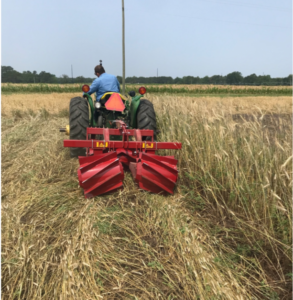Organic for Climate Research Priorities
September 1, 2020 – As legislators continue to consider comprehensive climate legislation, OFRF is working closely with Congress and partner organizations to ensure the voices of organic farmers are heard on Capitol Hill. Organic agriculture has great potential to sequester carbon, mitigate greenhouse gas (GHG) emissions, reduce the environmental impacts of fertilizers and pesticides, and build resilience to a changing climate in our farms, ranches, rural communities, and food systems. Significant investments should be made in organic agriculture to advance its climate change mitigation potential.
Historic wins for organic agricultural research in the 2018 Farm Bill provide $395 million for organic agriculture research and education over the next ten years and secure permanent funding for organic research at USDA. OFRF’s organic research priorities focus on ensuring this increased investment advances organic agriculture’s contribution to climate change mitigation and adaptation and responds to the top challenges facing producers who want to farm more sustainably.
Below is a summary of our recommendations:
- Advance soil health and fertility management to sequester carbon, reduce greenhouse gas emissions, and build resilience to climate change stresses – Soil health, soil biology and biodiversity, and fertility management remain top priority research topics for organic producers, especially as they experience the growing impacts of climate disruption. Further research is needed on organic soil management strategies that optimize agricultural resilience, carbon sequestration, and net GHG reduction.
- Increase research on systems-level approaches to weed, pest, and disease management to minimize pesticide use, conserve biodiversity, and enhance carbon sequestration – Organic farmers are prohibited from using synthetic inputs to manage weeds, pests, and disease, and therefore rely on some level of physical soil disturbance to control weeds. Crop diversification, cover cropping, weed-competitive cultivars, and sound nutrient management can limit weed pressures, reduce the need for tillage and cultivation, and thereby protect soil carbon and soil health. Organic farmers and all farmers will benefit from developing practical tools and integrated strategies to manage weeds with minimal tillage.
- Promote research on organic livestock and poultry, advanced grazing management, and crop-livestock integration to sequester carbon, reduce greenhouse gas emissions, and enhance climate resilience of livestock production systems – USDA-funded organic animal agriculture research continues to lag far behind consumer demand for organic meat, dairy, and eggs. Furthermore, recent research highlights the climate benefits provided by advanced rotational grazing and crop-livestock integration. More research is needed so organic ranchers are equipped with the tools and resources they need to manage livestock and poultry in climate-friendly ways.
- Promote breeding and development of new public crop cultivars for resilience to climate disruption and performance in climate-mitigating organic production systems – Privatization of the seed industry and replacement of public cultivars with patented seeds have substantially narrowed seed choices for farmers, and revoked their right to save and select seeds adapted to their local conditions. Furthermore, with ongoing climate disruption, farmers urgently need crop cultivars specifically developed for stress hardiness. Organic farmers need regionally adapted, climate resilient non-GMO seeds suited to their production systems and markets.
Read the complete research priorities here. Don’t forget to check out our climate toolkit for advocates, and policymakers and our policy recommendations for making regenerative organic farming systems part of the solution to the climate crisis.



 Balancing soil health and weed management is a serious challenge for organic producers. Tillage is an effective method of controlling weeds, but is energy intensive and can degrade soil health. Cover cropping is an alternative practice that can suppress weeds and build soil health. However, when to terminate cover crops is not straightforward. Terminating cover crops using a roller crimper—a piece of equipment that gently pushes the cover crop residue over the soil surface—has been shown to effectively suppress weeds in row-crops such as soybean, but less is known about the efficacy of roller-crimped cover crops in vegetable production. In 2019, OFRF provided a grant to Professor Alex Woodley at North Carolina State University to begin addressing this question in sweet potatoes, an economically important crop in North Carolina.
Balancing soil health and weed management is a serious challenge for organic producers. Tillage is an effective method of controlling weeds, but is energy intensive and can degrade soil health. Cover cropping is an alternative practice that can suppress weeds and build soil health. However, when to terminate cover crops is not straightforward. Terminating cover crops using a roller crimper—a piece of equipment that gently pushes the cover crop residue over the soil surface—has been shown to effectively suppress weeds in row-crops such as soybean, but less is known about the efficacy of roller-crimped cover crops in vegetable production. In 2019, OFRF provided a grant to Professor Alex Woodley at North Carolina State University to begin addressing this question in sweet potatoes, an economically important crop in North Carolina.